
Michael Kelland John Hutchence was an Australian musician, singer-songwriter and actor. Hutchence co-founded the rock band INXS, which sold over 75 million records worldwide and was inducted into the ARIA Hall of Fame in 2001. He was the lead singer and lyricist of INXS from 1977 until his death.

Jack McDevitt is an American science fiction author whose novels frequently deal with attempts to make contact with alien races, and with archaeology or xenoarchaeology. Most of his books follow either superluminal pilot Priscilla "Hutch" Hutchins or galactic relic hunters Alex Benedict and Chase Kolpath. McDevitt has received numerous nominations for Hugo, Nebula, and John W. Campbell awards. Seeker won the 2006 Nebula Award for Best Novel.

A humanoid is a non-human entity with human form or characteristics. The earliest recorded use of the term, in 1870, referred to indigenous peoples in areas colonized by Europeans. By the 20th century, the term came to describe fossils which were morphologically similar, but not identical, to those of the human skeleton.
Xenoarchaeology, a branch of xenology dealing with extraterrestrial cultures, is a hypothetical form of archaeology that exists mainly in works of science fiction. The field is concerned with the study of the material remains to reconstruct and interpret past life-ways of alien civilizations. Xenoarchaeology is not currently practiced by mainstream archaeologists due to the current lack of any material for the discipline to study.

First contact is a common science fiction theme about the first meeting between humans and extraterrestrial life, or of any sentient species' first encounter with another one, given they are from different planets or natural satellites. The theme allows writers to explore such topics such as xenophobia, transcendentalism, and basic linguistics by adapting the anthropological topic of first contact to extraterrestrial cultures.

Earth vs. the Flying Saucers is a 1956 American science fiction film from Columbia Pictures. It was produced by Charles H. Schneer, directed by Fred F. Sears, and stars Hugh Marlowe and Joan Taylor. The stop-motion animation special effects were created by Ray Harryhausen. The storyline was suggested by the bestselling 1953 non-fiction book Flying Saucers from Outer Space by Maj. Donald Keyhoe. The film was released as a double feature with The Werewolf.

Eye of Cat is a 1982 science fiction novel by American writer Roger Zelazny. It was among his five personal favorite novels from his own oeuvre.

Superman/Aliens is an American comic book limited series about a battle between the superhero Superman and the aliens created by H. R. Giger, from the Alien film series. The writers use the plot device of Superman's powers temporarily diminishing-due to him being in a location with a distinct lack of yellow sunlight that his body requires to give him his powers-to make the Xenomorphs a believable threat to the Man of Steel.
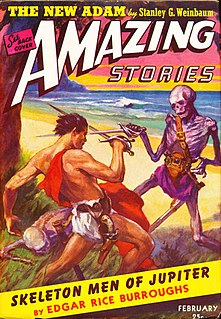
Jupiter, the largest planet in the Solar System, has appeared in works of fiction across several centuries. The way the planet has been depicted has evolved as more has become known about its composition; it was initially portrayed as being entirely solid, later as having a high-pressure atmosphere with a solid surface underneath, and finally as being entirely gaseous. It was a popular setting during the pulp era of science fiction. Life on the planet has variously been depicted as identical to humans, larger versions of humans, and non-human. Non-human life on Jupiter has been portrayed as primitive in some works and more advanced than humans in others.

Invasion is a 1975 horror novel by American writer Dean Koontz, originally released under the pseudonym Aaron Wolfe. In 1994 Koontz re-released the book under the title Winter Moon, including updates and revisions. Winter Moon is the current title under which the book can be purchased.

A Talent for War is a science fiction mystery novel by American writer Jack McDevitt, the story of a search by Alex Benedict, the protagonist, to discover the nature of a mysterious project Alex's uncle had been working on when the interstellar passenger ship, on which his uncle was a passenger, was lost in space. This investigation leads deep into the history of a war between human civilization and a neighboring alien civilization and challenges the foundation mythos of the current human government.

Seeker is a 2005 science fiction novel by American writer Jack McDevitt. It won the Nebula Award for Best Novel in 2006.
McDevitt is an Irish surname, originating in County Donegal in the northwest part of Ireland. This family name is a member of the ancient Northern O’Néill group of clans who resided in the Ulster province of Ireland.

The Hercules Text is a 1986 science fiction novel by American writer Jack McDevitt. It tells the story of a message of intelligent extraterrestrial origin received by SETI scientists. The Hercules Text was nominated for the Philip K. Dick Award in 1986.
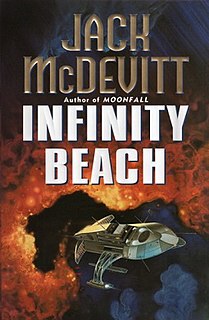
Infinity Beach is a 2000 science fiction novel by Jack McDevitt. It is a story of a first contact between human and alien civilizations.
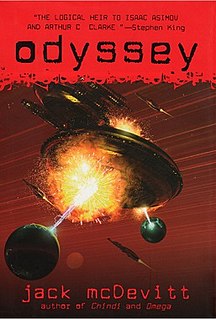
Odyssey is a science fiction novel by American writer Jack McDevitt. It was a Nebula Award nominee for 2007. It is set in the 23rd century and "explores the immorality of big business and the short-sightedness of the American government in minimizing support for space travel."
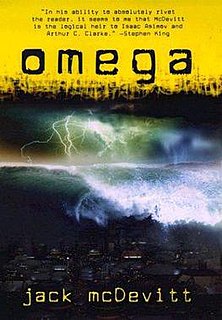
Omega is a book by Jack McDevitt that won the John W. Campbell Award, and was nominated for the Nebula Award in 2004.
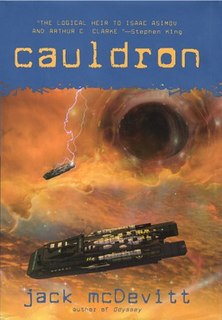
Cauldron is a 2007 science fiction novel by American author Jack McDevitt. It is the sixth novel in the Academy series, featuring Priscilla Hutchins.

The Engines of God is a science fiction novel by American author Jack McDevitt.
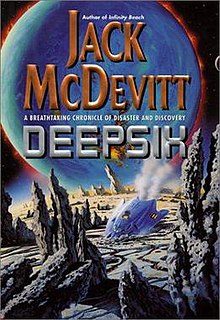
Deepsix is a novel by American science fiction author Jack McDevitt.


















